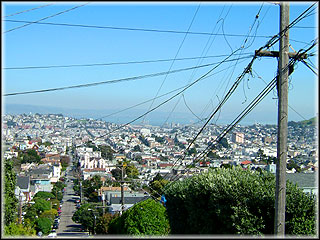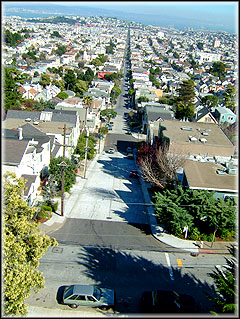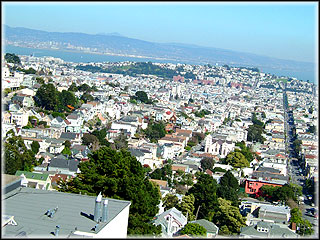Saturn-Neptune Opposition II(b): More Historical Drifts
3.21.07

(This is a continuation of this article detailing the historical precedents for our current Saturn-Neptune opposition.)
In his best-selling book The World is Flat, Thomas Friedman argues for the primary importance of the 1989 collapse of the Berlin Wall (and other related Cold War-ending events) in setting the scene for the currently-in-progress 'flattening of the world'—a convergence of technological innovation, global collaboration, and a massive influx of middle-class wealth in non-Western nations like China and India.
With the consequent disappearance of one big global-level 'us vs. them' bilateralism, the world's becoming reunified… as a single marketplace, in which the best and brightest folks from everywhere can compete on a 'flatter' playing-ground. According to Friedman, '[T]he fall of the wall enhanced the free movement of best practices. When an economic or technological standard emerged and proved itself on the world stage, it was much more quickly adopted after the wall was out of the way.'
While I'd adamantly stop short of claiming the global community no longer falls into neat categories of 'have' and 'have not', there is now a much wider variance of possibilities for ordinary folks all over the world. Armed with same basic language and knowledge frameworks, an up-to-date PC and a reliable Internet connection, anyone anywhere holds the potential to build a 'multi-national' company (though their initial access to education and resources remain the stickiest sticking-point). Friedman's book contains many poignant examples of how our world has 'flattened' in this way since '89, when Saturn and Neptune last conjoined.
Now, at the Saturn-Neptune opposition or 'halfway mark', we confront the new challenges spawned by what was set forth in '89 by this 'flattening'. The US, for instance, first reaped amazing abundance as a result… and then faced its decreasing dominance as the sole remaining 'superpower', while its global alliances became strained by the military involvement in Iraq.
In the aftermath of 'winning' the Cold War, America still struggles to find its most appropriate contemporary role, all while becoming increasingly vilified by other nations for its dominating tone. Saturn in Leo, might I remind you, is all about hitting the edge of a charismatic leader's legitimate authority, before his braggadocio overwhelms his rightfully-earned respect. This is a lesson for the country itself, as well as for its president.
The last Saturn-Neptune opposition in 1971-72 coincided with the turning point in public opinion regarding the Vietnam War, in which the US was inextricably involved at the time. During this period, the country witnessed massive protests as polls began to show a majority of Americans were now opposed to the war, while the number of deployed troops witnessed a significant drop.  We see a similar trend at the same point in this current cycle… though it remains to be seen whether the troop numbers will ultimately decrease or continue to bloat by presidential proclamation.
We see a similar trend at the same point in this current cycle… though it remains to be seen whether the troop numbers will ultimately decrease or continue to bloat by presidential proclamation.
The common thread? A collective examination of how our high-minded attempts to build structures that support our original idealistic visions (for let us assume the folks in power possessed some primordial kernel of good intention) have served their purpose, or become crystallized into something far less supportive than merely authoritative. This is the Saturn-Neptune dialogue in action.
The same dialectic is also being negotiated elsewhere on the globe, as the ramifications of 1989's 'flattening' events play themselves out. China continues to navigate the pitfalls of trying to maintain some centralized control over its people's culture, while making room for the unprecedented economic growth headed its way. Ask any expert, and they'll tell you China's the country to watch in the near future… but can its current governmental policies contain the unbridled capitalist glee blaring from its citizens?
Look back at 1971 and the last Saturn-Neptune opposition, and you'll find that was the exact moment when modern China symbolically zoomed into the world marketplace. Nixon made the first-ever presidential trip to Beijing, while the People's Republic replaced Taiwan as the UN's 'official' Chinese delegation. Nowadays, we look to China's necessary participation in resolving global political crises in North Korea and Iran—and if China, hypothetically speaking, decided to back either the Iranians or the North Koreans against the US and/or Europe, suffice it to say we'd suddenly face a very different game.
And in the Middle East, too, we're hitting the 'halfway' evaluative point of situations set powerfully into motion in 1989. In fact, that year contained several events with a direct correspondence to where we are now. 1989 marked both the official end to the Soviet occupation in Afghanistan and the death of Ayatollah Khomeini in Iran—two departures that left gaping holes to fill. In Afghanistan, this hastened the growth of the Taliban's power. In Iran, it set off a series of different governments, some more reform-minded than others, before eventually leading to the reassertion of conservatism with the election of President Ahmadinejad.
Also in '89, shortly before his death, Khomeini issued a death sentence on author Salman Rushdie for 'blaspheming' Islam in his novel The Satanic Verses. This was a fatwa heard 'round the world, giving many global citizens its first big taste of Islamic fundamentalist dogma. Meanwhile, the first George Bush assumed the American presidency that same year, setting the stage for the US's first war against Iraq which began the following year.
From this perspective, then, it's clear that the West (and specifically the US) is at a Saturn-Neptune moment of reckoning with the Arab world, as we confront the further developments born from the events of '89. From 'our' perspective, what we might've thought was ushering in greater Western-style freedom for the Mideast (i.e., the structural idealism inherent to the Saturn-Neptune conjunction) has instead proven to further exacerbate the rampant anti-US sentiment in the region… as well as instigating mega-chaos in both Iraq and Afghanistan, which I suppose is a type of 'freedom'.
At the same time, we should also wonder: How is the Saturn-oppose-Neptune disillusionment playing out on the 'other' side? From my place in the world, it's hard to know.



